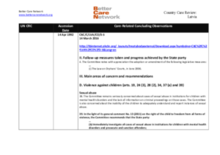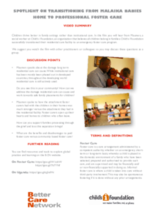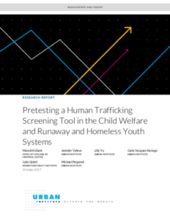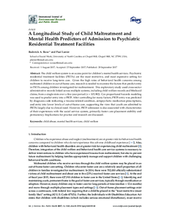Displaying 791 - 800 of 1510
This position paper from Opening Doors for Europe's Children explains the position of the organization in regards to the EU's Multiannual Financial Framework and the measures within it to support or inhibit the transition from institutional care to family-based care of children.
This article describes the 1‐year outcomes of youth transitioning out of a residential care facility in South Africa.
This country care review includes the care-related Concluding Observations adopted by the Committee on the Rights of the Child.
This article describes the 1‐year outcomes of youth transitioning out of a residential care facility in South Africa.
In this video, Maureen Orogot, a Social Worker at Child’s i Foundation in Uganda, shares the progress Child’s i Foundation has made on transitioning from a residential care model of alternative care to professional foster care.
Aiming to assist providers to identify and better serve the needs of youth victims of human trafficking, this study developed and pretested a Human Trafficking Screening Tool used to identify youth in the child welfare system and runaway and homeless youth who have experiences of trafficking,
This video series from Better Care Network, in partnership with Child's i Foundation, highlights promising practices in children's care in Uganda.
This exploratory study used cross-sector administrative records linked across multiple systems, including child welfare records and Medicaid claims, from a single state in the U.S. over a five-year period, to investigate the factors that predict entry into psychiatric residential treatment facilities for children.
The Ministry of Social Welfare, Relief and Resettlement of Myanmar, with the support of UNICEF, launched a set of guidelines and minimum standards, alongside monitoring and oversight plans, aimed at bettering the lives of children in residential care.
The Ministry of Social Welfare, Relief and Resettlement of Myanmar, with the support of UNICEF, launched a set of guidelines and minimum standards, alongside monitoring and oversight plans, aimed at bettering the lives of children in residential care.







